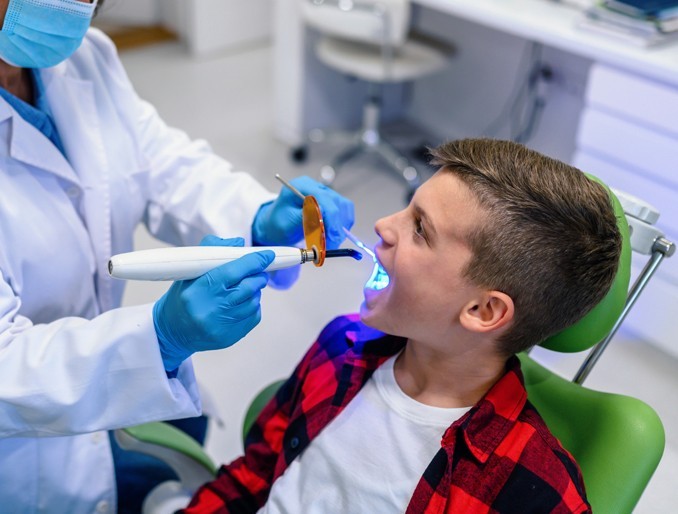If your child has cavities, you are not alone — cavities are very common in children. Even if you help your children take great care of their teeth and see the team at Tiny Teeth for routine care, they may still end up with a cavity as they continue to grow.
The reason is that children are just starting to develop good dental habits, and, especially in younger kids, they don’t have the ability to brush and floss properly on their own. This is combined with diets that contain snacks that are high in sugar, which can stick to teeth easily and cause decay over time.
Restorative treatments are meant to address tooth decay and damaged teeth. The dentist’s objective is to restore the look, feel and function of the tooth in order to bring your child’s smile back to exceptional oral health.
At Tiny Teeth, your child’s safety and comfort are our top priorities. We use the most advanced technology and techniques available to provide the best care possible.


Fillings
Composite resin fillings are a safe and effective way to restore the appearance and health of your child’s teeth. They provide a natural look, and blend in with the surrounding tooth structure, and are durable enough to last for many years. Fillings at Tiny Teeth are BPA-free — safe for your child.
What to expect
Once the cavity has been confirmed, the dentist will begin by numbing the area, gently remove all the decayed tooth structure, rebuild the tooth with a composite resin that matches in color. The dentist will then make any necessary adjustments and polish.
If you think that your child needs a filling, contact us now to schedule a consultation at Tiny Teeth of Lakewood.
Pediatric Dental Crowns
If your child has a severely damaged or decayed tooth, your pediatric dentist may recommend a crown. Pediatric dental crowns are made of stainless steel and are designed to save the baby tooth until it naturally falls out. Stainless steel crowns may be recommended to protect a primary tooth that is fractured or treated for decay and has insufficient residual tooth structure to support a filling. Maintaining the tooth can help avoid chewing and speech problems. Further it will ensure that the permanent teeth come in straight and prevent them from drifting.
Alternative treatment options may be provided. Your pediatric dentist will recommend the best material for your child based on his or her individual circumstances. It is important to note that every type of crown has its advantages and disadvantages. In order to ensure the oral health of your child, we will recommend what is in their best interest.
For more information about pediatric dental crowns, please contact our pediatric dental office today.


Pulpotomies
A pulpotomy is commonly called a “nerve treatment” for the baby tooth. When a cavity gets really deep, and touches the nerve, the tooth becomes irritated and inflamed. This can result in sensitivity or pain.
A pulpotomy is not the same as a root canal! During the procedure the dentist will remove all the infected nerve located in the crown of the tooth only. The remaining portion of the nerve inside of the root is left intact.
To learn more about pulpotomies for children and to schedule an appointment for your child, please contact our office today.
Silver Diamine Fluoride
Silver Diamine Fluoride (SDF) is a liquid that helps prevent tooth decay and strengthens teeth. It effectively stops the progression of cavities and helps maintain a healthy smile. SDF is a non-invasive treatment that can be done in the comfort of our dental office.
To learn more about Silver Diamine Fluoride, and to determine if it is the appropriate treatment choice for your child, schedule an appointment at Tiny Teeth of Lakewood by contacting our office today.





